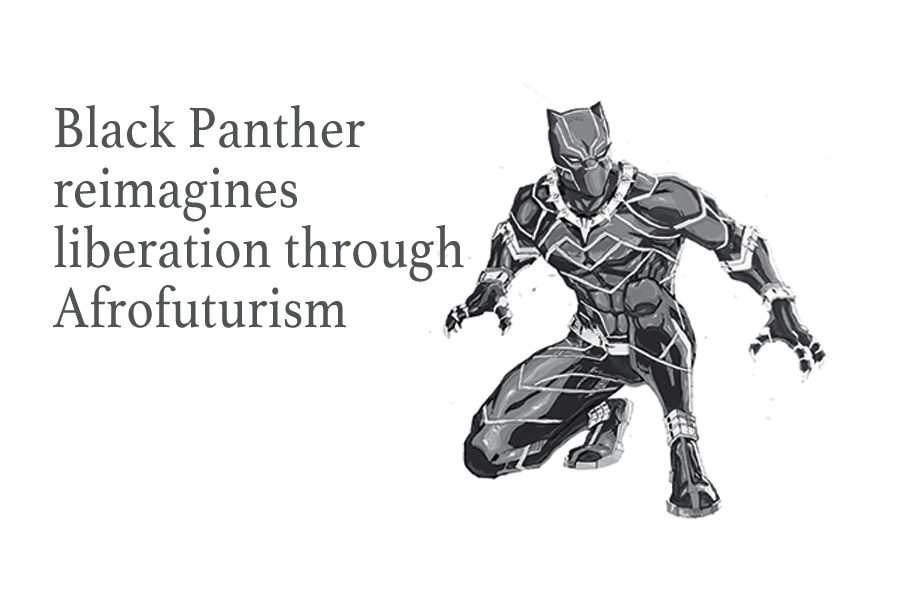Black Panther reimagines liberation through afrofuturism
Blending black cultural identity with the supernatural, “Black Panther,” which grossed $426 million worldwide in its opening week, challenges the popular tropes of science fiction films and proposes a new narrative of inclusion. “Black Panther” introduces millions of moviegoers to a reimagined futuristic landscape.
Saturday night, Tulane University and Loyola University New Orleans’s Black Student Unions collaborated to host a private screening of “Black Panther” at The Broad Theatre which garnered a large turnout from both universities.
“I think that Loyola and Tulane’s BSUs watching ‘Black Panther’ as a group heightened the experience,” Tulane BSU president Will Smith said. “We have been having conversations surrounding the diaspora, black sustainability and what it means to be black versus what it means to be African, and a lot of those themes were prevalent in the movie.”
“Black Panther” stands out among other major Hollywood productions due to its inclusion of cultural Africanism, the incorporation of black liberation in a futuristic utopia and the placement of African-American actors, directors and writers at the forefront of a traditionally white-dominated genre.
None of these stories are about race, yet they have cast white people by default. They each deal with fantastical elements yet seem to have found it “unrealistic” to cast POC in anything but the periphery.
— Dylan Marron (@dylanmarron) February 14, 2018
“I felt beautiful watching my sisters being empowered and showing levels of strength that no other movie has represented them in,” Tulane senior Jade Berfect said. “… I thought that the movie was a great representation of our past, present and future.”
The film, however, is just one of many projects that falls under the aesthetic of Afrofuturism, which reimagines blackness in a fantastical or futuristic setting through visual art, music, fashion and literature.
“The term speaks to the imaginative potential of people of the diaspora to see themselves as having a future, a future that they have the power to define themselves,” Professor Ladee Hubbard, who teaches “Afro-Futurism: Science Fiction and Surrealism in African-American Literature & Culture,” said. “As opposed to being nihilistic about the circumstances, about racism, about different forms of oppression, it is claiming an imaginative space to explore the possibility of diasporic identity.”
Afrofuturism, a term coined in 1992, provides a space for black artists to construct a reality in which blackness and science fiction fuse, often envisioning an alternative reality.
Beyond film, Afrofuturism can be found in literature. “The Intuitionist” by Colson Whitehead details the efforts of Lila, a black woman living in a highly divided society who discovers technology that could elevate it. Octavia Butler, a renowned Afrofuturist author, has written a myriad of works featuring powerful black female protagonists throughout time and space.
In music, Beyonce’s visual album “Lemonade” reframes black womanhood and identity into a unifying experience while incorporating traditional African and diasporic aesthetics. Flying Lotus has also been an innovator in the sonic expression of Afrofuturism. He incorporates a dreamy blend of traditional African rhythms, jazz and engineered sounds paired with collaborations from Kendrick Lamar, Thundercat, Erykah Badu and others to create a soundtrack for a futuristic black consciousness.
“Afrofuturism addresses themes and concerns of the African diaspora through a technoculture and science fiction lens, encompassing a range of media and artists with a shared interest in envisioning black futures that stem from Afrodiasporic experiences.” pic.twitter.com/sRBfCL00eb
— Wanna (@WannasWorld) February 17, 2018
By applying Afrofuturism to film, Black Panther’s director Ryan Coogler combines components from distinct African cultures and tribes with an imagined technologically advanced black society, isolated from the cultural corrosion of colonization and slavery. Coogler gives black people a chance to imagine a reality that allows for the reclamation of a lost cultural heritage and a celebration of black innovation.
“Black Panther” may inspire viewers to question the dominant narrative of futuristic stories, which often exclude outward expression of ethnic distinction or eliminate those from diverse backgrounds all together.
“A lot of the time the things that make people distinct culturally are not represented on the screen and even if there are people of color, they’re just there,” Hubbard said. “Is there a contradiction between having a specific cultural identity and the ability to imagine yourself with that culture in the future?”
“Black Panther” shows that there is room for both the celebration and preservation of cultures in science fiction without compromising the futuristic elements of the story. Afrofuturism as a genre, whether through the platform of film, music or other artistic expressions, inspires Afrodescendants to feel pride in their culture and provides hope for a future that includes a global black consciousness.
“Afrofuturism is so important because it allows us to imagine what the world could be like for black and African culture,” Tulane senior Hannah Broussard said. “When we dream big it inspires us to accomplish bigger and better things.”
Your donation will support the student journalists of Tulane University. Your contribution will allow us to purchase equipment and cover our annual website hosting costs.




